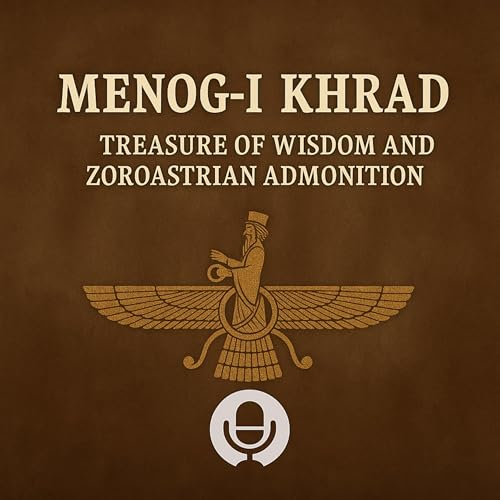
Echoes of Eternal Wisdom
Failed to add items
Add to basket failed.
Add to Wish List failed.
Remove from Wish List failed.
Follow podcast failed
Unfollow podcast failed
-
Narrated by:
-
By:
About this listen
Ancient Persian Wisdom Traditions and Zoroastrianism
This briefing document synthesizes key themes and facts regarding ancient Persian wisdom traditions, with a special focus on Zoroastrianism and its associated texts.
I. The "Wisdom-Religion" in Ancient Persia
H.P. Blavatsky, a central Theosophical thinker, proposed a universal “Wisdom-Religion” present across cultures. Ancient Persia, though dominated by Zoroastrianism, fostered diverse intellectual traditions. Royal courts preserved spiritual and practical knowledge as guiding principles for rulers and society.
II. Treasured Books and Royal Wisdom
Persian kings likely possessed “treasured books” for counsel and memory. The Old Testament (Esther 6:1) references royal chronicles, while Ctesias of Caria noted “royal parchments.” These records contained two strands:
Big History: creation myths and dynastic accounts, exemplified by Cyrus the Great’s liberation of the Jews.
Wisdom Teachings: ethical and spiritual guidance, such as the Persian emphasis on riding, archery, and truthfulness.
III. Big History: The Shahnameh
The Shahnameh, Ferdowsi’s 50,000-couplet epic (1020 AD), is the most complete form of Persian Big History. It spans from Kayumars, the first man, to the fall of the Sasanians.
Zoroastrian Themes: the cosmic struggle between light (Ahura Mazda) and darkness (Ahriman).
Philosophy: stories framed with divine praise, pathos, and ethical reflection.
Impermanence: reminders of mortality—echoed later by Omar Khayyam—highlight life’s fragility.
Rooted in Sassanian texts like the Khotay Namak, the Shahnameh preserved pre-Islamic wisdom within a poetic framework.
IV. Perennial Philosophy: Javidan Kherad
The Javidan Kherad (“Eternal Wisdom”) embodied perennial philosophy in Persian courts. Rediscovered under Caliph Ma’mun in the 9th century, it offered timeless moral insights:
“The source of all things lies in God.”
“The highest gift to humanity is wisdom.”
The Mēnōg ī Xrad (“Spirit of Wisdom”), a Middle Persian work, belongs to the andarz (advice) genre, with 62 Q&As on daily conduct, dualism, afterlife, and resurrection. Likely compiled in late Sassanian times, it reveals both practical and metaphysical depth.
V. Zoroastrianism: Core Beliefs and Texts
Zoroastrianism, founded by Zarathustra, centers on Ahura Mazda and Angra Mainyu’s cosmic opposition. Followers pursue “good thoughts, good words, good deeds.”
Afterlife: souls face judgment, resurrection, and final purification in a molten river—pleasant to the righteous, painful to others.
Texts: Avesta, Zand, Denkard, Bundahishn, and Dadestan-i Denig preserved doctrine. The Persian Rivayats later linked Iranian priests with Parsis in India.
Zurvanism: a heterodox branch positing Zurvan (Time) as father of both Ahura Mazda and Angra Mainyu.
VI. Philosophical Relevance Today
Zoroastrianism contributes to enduring debates on evil, justice, and salvation:
Limited Omnipotence: Ahura Mazda cannot yet eliminate evil, allowing for moral struggle.
Merit Theodicy: suffering grants merit that enriches eternal reward.
Quasi-Universalism: all may eventually be purified, though in varying degrees, balancing justice with mercy.
Identity and Change: purification raises questions of continuity between the flawed earthly self and the redeemed eternal self.
Conclusion
Persian wisdom traditions—through chronicles, epics, andarz texts, and Zoroastrian theology—offer profound perspectives on ethics, history, and humanity’s place in the cosmos. Their enduring relevance lies in weaving together Big History and Eternal Wisdom.


